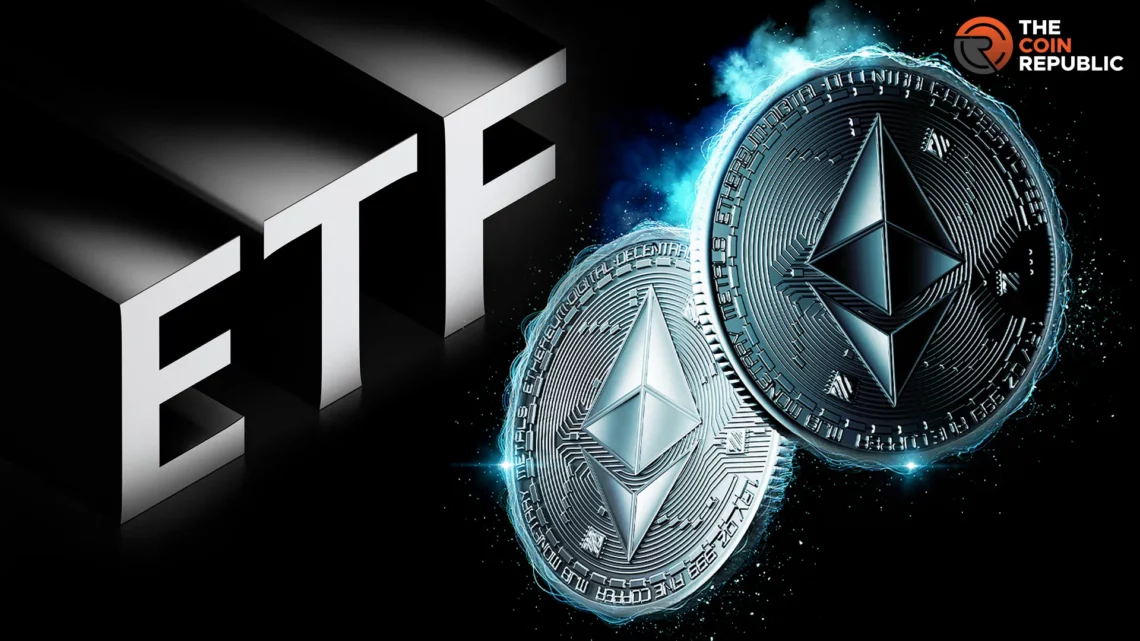Ether future ETFs are investment funds that tracks Ethereum futures, not Ethereum itself.
The ETHF fund managers constantly trade new futures contracts close to expiration, using capital from the ETFs assets to maintain exposure across the futures curve.
Ether is the cryptocurrency of Ethereum blockchain ,belonging to Ethereum ecosystem. It is used for transaction fees and computational services on the Ethereum network.Ether owners help in securing the blockchain in Ethereum’s Proof-of-Stake (POS) unanimity. Data is secured while validating entries in a distributed database.
Ethereum is a decentralized blockchain and has a smart contract functionality. Ethereum was visualized in 2013 by Vitalik Buterin. Development and crowdfunding started in 2014 and the network was live on July 30, 2015. Users can interact by deploying permanent and immutable decentralized applications onto it.
Decentralized finance(DeFi) applications provide monetary contracts that do not rely financial intermediaries like brokerages, banks or any other financial institution. Ethereum also lets its user create non-Fungible tokens (NFTs), tokens that can be used to unique digital assets.
Ethereum has a strong hold in crypto world and has emerged as the top contender for Bitcoin in terms of market cap and popularity. Bitcoin is often equated to digital gold due to its fixed supply but on the other hand Ethereum trailblazes with its smart contract versatility. It offers new possibilities for dApp ecosystem.

Ethereum expert analysis FY24
Ethereum is programmable which allows users to deploy various dApps on top of blockchain.
Ether’s price has been highly volatile ,however it grew formidably amid the increased adoption of DeFi and NFT’s. Future based ETF’s provide investors with indirect exposure to cryptocurrency price movements without directly owning or storing the underlying assets. Ether’s price has gone up since spot bitcoin ETFs began trading in early 2024.
Overall, Ethereum is paving for a decentralized global computing infrastructure that increases the use of blockchain and cryptocurrency.
Futures & Future-Based ETFs
A futures contract is a legal agreement to buy or sell a particular commodity asset or security at a price determined beforehand and at a specified time in the future.
The buyer of the future contract is taking on the obligation to buy and receive the underlying asset at the expiration date. They allow you to take risks and bets on the direction you believe asset prices are moving without actually owning them. They are used for commodities like gold and now used in cryptocurrencies.
Let’s break it down in more easy words . Suppose you enter a four month ether futures contract to buy ether at $1700. If Ether trades above $1700 in four months, you profit by getting Ether below market price. If it’s below $1700, you lose more money than if you bought ether on the spot market.
All investors have to roll over their positions into new agreements as standard future contracts have set expiration cycles. Considering a contract that executes purchasing Ethereum at a specific price and a specific time. These derivative contracts are traded through Ether(ETH) futures exchange -traded funds(ETF’s) thus providing a synchronized method of investing in Ethereum using a brokerage account.
In 2021, the first Ether futures ETF’s were introduced in Canada. Although , futures based ETF’s have been approved , the United States Securities and Exchange commission( SEC) has not yet approved a spot Ether ETF in the country.
Ether future ETFs are supervised by Asset Management companies. The major issuers of Ether futures ETF’s are Bitwise,VanEck and Proshares. These firms are responsible for complexities involved in disposing and purchasing of future contracts and they also control rollovers to preserve exposure.
The Contango effect in futures markets can negatively impact long term returns of future based ETF’s like those tracking ether futures.
What Is Contango?
Contango is a situation where the futures price of a commodity is higher than its spot price. Contango occurs usually when an asset’s price is expected to increase over time. Advanced traders can use arbitrage and other strategies to profit from contango. Contango brings losses for investors in commodity ETFs using future contracts, however these losses can be avoided by owning ETFs that hold actual commodities.
Factors affecting Contango to arise are:
- Inflation: Rising costs increase the cost of carrying.
- Political instability: Supply systems and trading routes are disrupted.
- Weather: Crops may not grow or be harvested as expected.
- Sentiment: Traders and Investors can change their mind about the market.
Generally, Contango makes investors believe that prices are going to rise. It indicates that demand is higher than the supply, causing futures prices to rise.
Ethereum ETF’s
Ethereum ETF’s can be thought of as a basket of securities representing Ethereum’s values. The concept of Ethereum Exchange-traded-funds , has captured the attention of investors worldwide. An Ethereum ETF is transacted on traditional stock exchanges rather than direct purchase of Ethereum on a crypto exchange platform.
An Ether ETF helps investors with Ethereum’s price movements without requiring them to purchase or hold the cryptocurrency directly. Here’s how Ethereum ETF’s work :
- Structure and Purchase Method : An Ethereum ETF is set up by a fund manager who creates a fund to track price movements of Ethereum. Investors can buy or sell shares of this ETF on traditional stock exchanges.
- Exposure to Ethereum’s Price : The value of Ethereum ETF is directly linked to the price of Ethereum . The value of the ETF falls and rises corresponding to Ethereum’s price . This allows investors to keep an eye without actually owning it.
Assume and Ether futures ETF has a contract to purchase 100 ETH at a price of $3000 each in three months. The ETF gains profit ,and it’s share price rises if Ether reaches $3500 by the contractor’s expiration date. In contrast the ETF faces a loss if ETH price falls below $2500.
A pivotal point to remember is that Ether future ETF’s continuously manage their contracts by rolling them over to preserve exposure.
To invest in an Ether futures ETF,select a brokerage, find the desired ETF, such as VanEck Ethereum strategy ETF. Research it thoroughly and place an order to complete the purchase.
In conclusion, Ether future ETF’s may provide considerable tax benefits in some jurisdictions. Additionally , investors can keep an eye on a drop in the price of ETH with future based ETF’s increasing the chances of profit from market downturns .
The potential of Ethereum ETF’s is undeniable as it is bridging the gap between traditional finance and the exciting world of crypto.

Nancy J. Allen is a crypto enthusiast, with a major in macroeconomics and minor in business statistics. She believes that cryptocurrencies inspire people to be their own banks, and step aside from traditional monetary exchange systems. She is also intrigued by blockchain technology and its functioning. She frequently researches, and posts content on the top altcoins, their theoretical working principles and technical price predictions.


 Home
Home News
News








